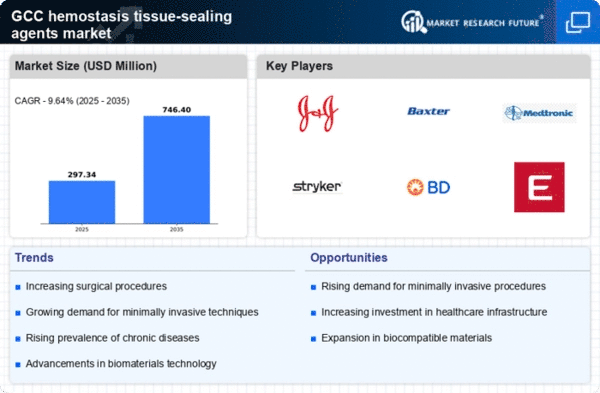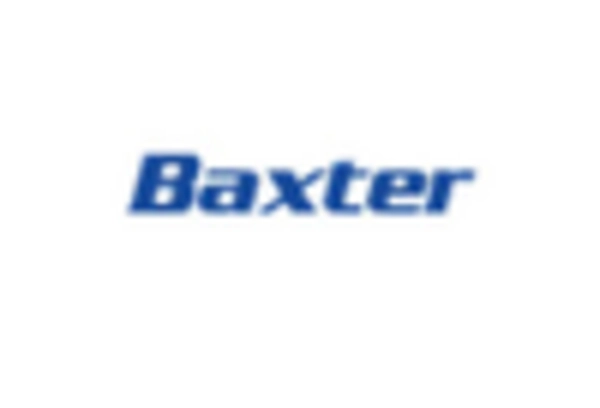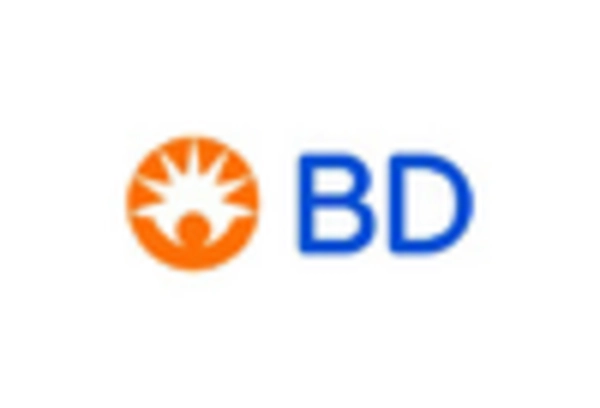Advancements in Biocompatible Materials
The hemostasis tissue-sealing-agents market is benefiting from advancements in biocompatible materials that enhance the performance of sealing agents. Innovations in polymer chemistry and bioengineering have led to the development of new materials that not only improve the efficacy of hemostatic agents but also reduce the risk of adverse reactions. In the GCC, the market for biocompatible hemostatic agents is expected to expand as healthcare providers increasingly adopt these advanced materials. The integration of biocompatible components into tissue-sealing agents can potentially increase their market share by addressing safety concerns and improving patient outcomes. This trend reflects a broader movement towards safer and more effective surgical solutions, which is likely to shape the future landscape of the hemostasis tissue-sealing-agents market.
Growing Investment in Healthcare Infrastructure
The hemostasis tissue-sealing-agents market is poised for growth due to the increasing investment in healthcare infrastructure across the GCC region. Governments and private entities are channeling funds into modernizing hospitals and surgical facilities, which enhances the availability of advanced medical technologies. This investment is likely to facilitate the adoption of innovative hemostatic solutions, as healthcare providers seek to improve surgical outcomes and operational efficiency. With an estimated increase in healthcare spending by 10% annually, the demand for effective tissue-sealing agents is expected to rise correspondingly. Enhanced healthcare infrastructure not only supports the procurement of advanced hemostatic agents but also fosters an environment conducive to research and development, further propelling market growth.
Increasing Demand for Minimally Invasive Surgeries
The hemostasis tissue-sealing-agents market is experiencing a surge in demand due to the rising preference for minimally invasive surgical procedures. These techniques are associated with reduced recovery times, lower risk of infection, and minimal scarring, which appeal to both patients and healthcare providers. As surgical practices evolve, the need for effective hemostatic agents that can facilitate these procedures becomes paramount. In the GCC region, the market for minimally invasive surgeries is projected to grow at a CAGR of approximately 8% over the next few years, driving the demand for innovative hemostasis solutions. This trend indicates a shift in surgical paradigms, where the efficacy of tissue-sealing agents plays a crucial role in enhancing patient outcomes and operational efficiency.
Rising Incidence of Trauma and Surgical Emergencies
The hemostasis tissue-sealing-agents market is significantly influenced by the increasing incidence of trauma and surgical emergencies in the GCC region. Factors such as urbanization, road traffic accidents, and lifestyle-related health issues contribute to a higher number of surgical interventions. According to recent statistics, trauma cases have risen by nearly 15% in the past five years, necessitating the use of effective hemostatic agents to control bleeding during emergency surgeries. This growing need for rapid and reliable hemostatic solutions underscores the importance of tissue-sealing agents in trauma care, thereby propelling market growth. The ability of these agents to provide immediate hemostatic control is vital in emergency settings, making them indispensable in modern surgical practice.
Rising Awareness of Patient Safety and Quality of Care
The hemostasis tissue-sealing-agents market is increasingly influenced by the rising awareness of patient safety and the quality of care in surgical settings. Healthcare professionals and institutions are prioritizing the use of effective hemostatic agents to minimize complications associated with bleeding during surgeries. This heightened focus on patient safety is driving the demand for reliable tissue-sealing solutions that can ensure optimal surgical outcomes. In the GCC, initiatives aimed at improving healthcare quality are likely to boost the adoption of advanced hemostatic agents, as hospitals strive to meet regulatory standards and enhance patient satisfaction. The emphasis on quality care not only impacts purchasing decisions but also shapes the competitive landscape of the hemostasis tissue-sealing-agents market.
















